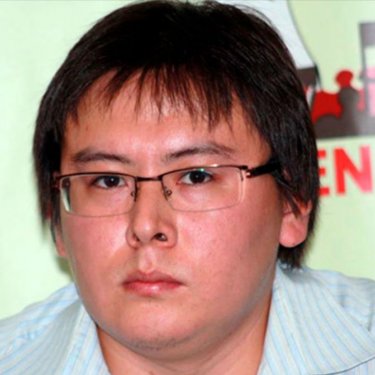Kazakh editor’s arrest aims to silence opposition paper

Reporters Without Borders (RSF) calls for the immediate release of Zhanbolat Mamay, the editor of the opposition newspaper Tribuna/Sayasi kalam, whose arrest on 10 February in Almaty shows that the Kazakh government’s persecution of the country’s few remaining independent media outlets is not letting up.
On 11 February, a court ordered Mamay held for at least two months pending trial on a charge of money-laundering, which carries a possible seven-year jail sentence.
Investigators have interrogated five of his colleagues, family members and close associates, including deputy editor Inga Imanbay, and have conducted searches in which notebooks, mobile phones, computers and other electronic devices were seized.
At the same time, the newspaper’s owner has been pressured into closing the business and firing Mamay.
Mamay is alleged to have funded the newspaper in 2013-2014 with the help of Mukhtar Ablyazov, a wealthy businessman and opposition politician now living in France. The authorities claim that Mamay used his legal newspaper publishing activity to launder money previously embezzled by Ablyazov.
Both Mamay and Ablyazov deny ever being in contact. “I have never had any economic or financial activities in my life,” Mamay has repeatedly insisted.
“The sole aim of Zhanbolat Mamay’s arrest is to silence one of the few remaining critical media outlets in Kazakhstan,” said Johann Bihr, the head of RSF’s Eastern Europe and Central Asia desk.
“We ask the authorities to release him without delay and to drop the charges against him, which are clearly politically motivated. It is high time that the government’s international partners denounced the destruction of pluralism in Kazakhstan.”
The claim that Ablyazov funded Tribuna/Sayasi kalam seems all the more absurd given that the newspaper has been dogged by economic problems causing repeated delays in paying its printers and the salaries of its employees.
Ablyazov was in prison in France in 2013 and 2014, when he was supposed to have been funding the newspaper. He was not released until December 2016, when France’s Council of State definitively rejected the requests for his extradition.
The already fraught climate for the media in Kazakhstan became suffocating after the simultaneous closure of the leading national opposition media outlets in December 2012. Since then, any attempt to launch new independent publications is quickly quashed. Arrests of journalists and bloggers are also common.
Kazakhstan is ranked 160th out of 180 countries in RSF’s 2016 World Press Freedom Index.


